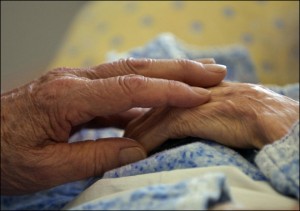Double-Standard for the Demented
 The late medical essayist Lewis Thomas once described Alzheimer’s as “the worst of all diseases, not just for what it does to the patient, but for its devastating effects on family and friends.”
The late medical essayist Lewis Thomas once described Alzheimer’s as “the worst of all diseases, not just for what it does to the patient, but for its devastating effects on family and friends.”
For anyone who has witnessed the ravages of Alzheimer’s firsthand, as I did during the dozen-plus years that my father battled it, Thomas’ statement rings true. Alzheimer’s horrifies us because it strikes at the heart of our relationship with its victims, erasing their memories of us and threatening to sever our emotional connection to them. It steals autonomy and rationality, the very qualities that our individualistic culture prizes above all others. For those who view independence, choice and control as life’s ultimate goods, living with Alzheimer’s — or caring full-time for one of its victims — can seem to be a fate worse than death.
That dim view of life with dementia clearly resonated with Charles Darwin Snelling, an 81-year-old prominent Pennsylvanian who made national headlines two weeks ago when he killed himself and his Alzheimer’s-stricken wife of 61 years, Adrienne. Snelling attracted particular attention because of his status as a wealthy politico and because of an essay he had penned in The New York Times in December, which described the “redemption” he had found in “learning how to nurture” his wife since her dementia diagnosis six years ago. Less than four months after writing of his “charmed life” with Adrienne, Snelling took both their lives, leaving behind five children and 11 grandchildren.
The story was shocking in itself, but more startling was what followed: a nationwide rush to cast Snelling’s story as a sort of “Romeo and Juliet” for the elder set. His children set the tone, releasing a statement that described the deaths as “a total shock” while asserting that their father “acted out of deep devotion and profound love.” Such a sympathetic interpretation is understandable coming from grieving relatives, but it was parroted far and wide by pundits and readers alike, who greeted the deaths as part of a noble and selfless “mercy killing.” Given how horrific a disease Alzheimer’s is, many commented, it was only right and loving that Snelling kill his beloved wife rather than allow her to suffer its indignities.
That sanguine view of murder-suicide among elders is not unprecedented. Nor is Snelling’s story unique. Tales of aging, caregiver husbands killing their demented wives and themselves have been steadily cropping up in news stories in recent years. The deaths often are gruesome — Alzheimer’s sufferer Neva Hurt of Virginia died after her husband tied a plastic shopping bag around her neck to suffocate her; Alzheimer’s patient Jeanne Hoez of Pennsylvania perished after her husband pumped carbon monoxide from their minivan into their bedroom — but their perpetrators frequently are treated not merely as tragic figures but as heroic ones.
Behind this sympathetic media treatment lurks a troubling double standard: the idea that behavior we would regard as cruel, selfish and criminal under any other circumstance is acceptable, even commendable, when directed to demented elders.
The trend of glorifying murder-suicides among elders worries Donna Cohen, a University of South Florida psychology professor who studies the issue. Cohen told me that these cases, while rare, appear to be on the rise. And contrary to the “mercy killing” label, her research indicates that most women who die this way “are unaware and do not consent” to their deaths.
“This is usually a depressed and exhausted male spouse’s decision,” Cohen explained by email, when I asked for her take on the Snelling case and those like it. “I believe that even though Mr. Snelling and his wife were intertwined and devoted to each other, the act was one of depression and desperation.”
The stress on spouses like Snelling is undoubtedly intense: Studies have shown that caring for a demented loved one puts one at increased risk for depression, social isolation, chronic health problems and even cognitive decline.
“It is critical to screen for depression and talk with caregivers about their desires to commit such acts,” Cohen said. “Depression is blinding.”
Equally critical is the fortification of support networks for exhausted caregivers, who too often labor in isolation from their extended families and a wider culture that treats elder care as a trivial pursuit. The vast majority of these caregivers respond to the frailty of their demented loved ones not with violence but with quiet, faithful service, hour after hour, day after day, year after year.
These men and women are the true heroes of the Alzheimer’s battle; theirs are the real love stories worth celebrating. And it’s past time we started recognizing their sacrifices for what they are: a powerful testament to the truth that the human person’s inherent dignity and right to life are gifts no disease, not even Alzheimer’s, can take away.

